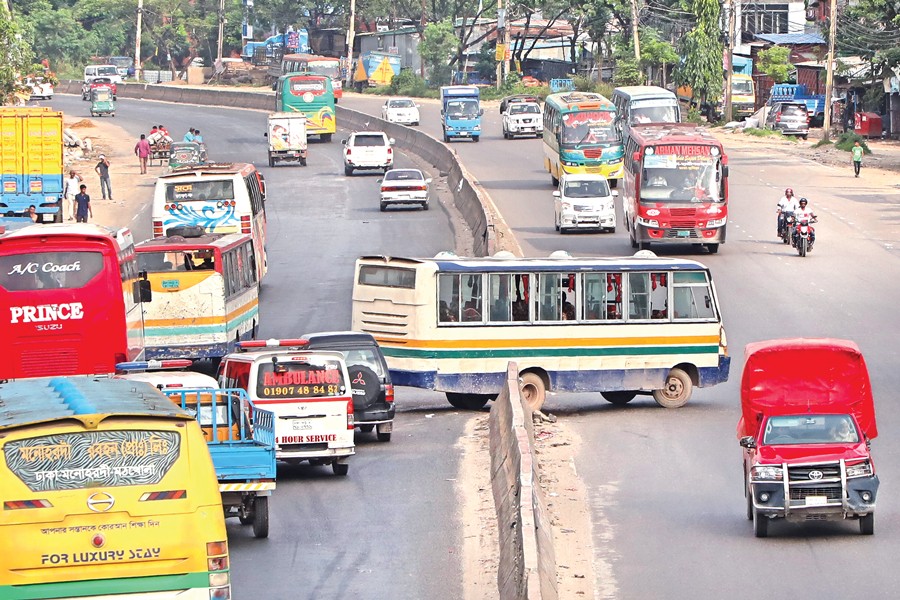
Published :
Updated :

When most driving seats are occupied by millions of unprofessional, untrained drivers risking passengers' lives almost daily, the authorities concerned hardly pay any heed to train them for road safety.
However, a small part of a fresh Tk 49.8-billion project involving four agencies plans to train 60,000 new drivers to ensure road safety keeping no space for training existing 3.0-million drivers. The project is in the planning stage, the development project proposal (DPP) of which has been finalised.
But the agencies, including the Bangladesh Road Transport Authority, the Bangladesh Police and the Bangladesh Road Transport Corporation, have separate road-safety schemes with funds from different partners.
According to analysts, these programmes or projects spend a lion's share of money on raising awareness or procuring equipment without focusing on unsafe road.
When planned, they allege that training is designed for few hours of a day which could hardly play any role in changing their behaviour or etiquettes for road safety.
The last Wednesday's accident in Jhalakathi town shows how important it is to train the country's so-called licensed commercial drivers.
"Most drivers during training say we already know what you (trainers) have trained us," said a BRTA instructor when asked why existing drivers' training is not designed in any old or new road-safety projects.
Recognising the need for training bus-truck-lorry drivers with due importance, he, however, said the BRTA tried to incorporate them in the big-budget project but failed on grounds of the high demand for new drivers.
As a result, sector observers say freshers also behave the same as older drivers showing the example of "taking the same shape of a bowl".
Meanwhile, psychologists say mindset change of drivers having problems like long deprivation of proper salary or addiction need long counselling apart from technical skills training to drive with lesser mistakes.
They must go through psychological test before getting any driving licence.
According to psychologist Roufun Naher, street behaviour shows the state of mental health of the country's drivers.
"They must be screened to detect level of anxiety, anger and depression as these are apparent when we see them in continuous honking, overtaking or quarrel in silly matter."
The assistant professor of educational and counselling psychology at Dhaka University says as the government prioritises road safety, it should also focus on drivers' mental health screening and training.
According to the BRTA, 3.22-million licensed professional drivers are in the driving seats against the demand for vehicles three times higher.
At present, drivers of all professional and unprofessional categories get licence from BRTA either taking training from BRTA-approved private training centres or from the BRTC training Institute.
But hundreds of unauthorised training schools are also there to fill streets with drivers for heavy vehicles, although bus-truck-lorry driving is the most challenging than other vehicles.
Huge individuals of this category also became drivers from helpers while assisting other drivers.
This means drivers whether professional or unprofessional, commercial transport drivers or private car drivers get licence without doing such certified training.
Once drivers used to manage fake licences, but now these drivers have got genuine licences from BRTA after short training during the licence-renewal time.
The streets are a playing ground for them to earn skills running over other vehicles or passers-by.
Nur Nabi Shimu, chairman of Driver Training Centre (DTC), a first-of-its-kind company established at Purbachal, says they have so far trained 8,000 licensed drivers paying them for a day's allowance.
But it was hard to convince them to take part in their planned three-day training, he told the FE.
As drivers have no institutional training and go through long deprivation they go through mental problems, which cannot be addressed in a single day's or two days' training, he observes.
Most of the 8,000 drivers took a day's training as they are neither interested in staying long time nor company owners letting them do month-long training.
The DTC trains new drivers for a three-month training taking fees.
However, playing with drivers by transport owners or others are not new. There are political commitments from ministers and directives from the prime minister on several occasions which were also not executed.
The premier's directives came on 25 June 2018 following series of road accidents to set up resting place drivers on highways, not allow driving long hour at a time were yet to be executed.
The Roads and Highways Department has taken move to set up four such resting places since then but none of those centres are ready.
RHD project director KM Nure Alam told the FE that although some centres are ready, they have now taken new plan to increase the capacity and facilities considering huge demand for those.
Md Amanullah, project director of the World Bank-funded road-safety project, said the new project tried to cover all aspects of road safety, admitting that it focused more on preparing new drivers than upgrading old ones.
Asked why not given importance to them, the additional chief engineer told the FE that as the project details were still at planning stages, had the government wanted it could be included or new project be taken.
smunima@yahoo.com


 For all latest news, follow The Financial Express Google News channel.
For all latest news, follow The Financial Express Google News channel.